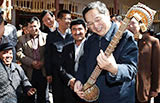Harder line taken in quest for efficiency
By Zhao Yinan (China Daily) Updated: 2015-09-17 07:48
The State Council pledged on Wednesday tougher punishment for officials who have failed to streamline government powers to improve efficiency.
The move is the latest attempt to compel officials to better fulfill their duties in what is a priority mission for the central government.
The council asked higher-level government agencies to delegate more powers, especially those in crucial sectors or closely related to business operations, to lower-level authorities to improve business efficiency and help economic growth.
It also banned the illegal collection of fees when companies apply for government approval for business operations, according to a government circular.
The decision came after third-party institutions hired by the central government found that some local officials had failed to faithfully carry out government policies.
At the meeting, senior council officials, including vice-premiers, state councilors and ministers, listened to evaluation reports on the implementation of central government policies in local areas.
The meeting was presided over by Premier Li Keqiang.
The central government had earlier entrusted several third-party institutions, including think tanks, nonprofit organizations and academies, to assess policy implementation.
In his annual Government Work Report in March, the premier publicly criticized sloppy officials who "would rather stand idle than do work to prevent making mistakes".
Zhu Lijia, a professor at the Chinese Academy of Governance, said that as the nation shifts its focus from economic expansion to more balanced development, some officials have become less motivated at working to increase economic growth.
Delegation of power to lower-level governments - aimed at encouraging market vitality - has been a major priority for the government since it took office in 2013.
Zhu said the government used to evaluate policy implementation on its own, but this was prone to influence from local officials, as they direct working relations with central government officials.
The All-China Federation of Industry and Commerce, one of the institutions invited to carry out third-party evaluations, said it attached great importance to the work, according to a report on yicai.com, a financial news website.
The report said the federation had held seminars with more than 1,600 enterprises and visited 278 corporate leaders in 12 provincial areas.
"We cherished the hard-won opportunity," the federation was quoted as saying in the report.
- Tough battle forecast for gender imbalance
- Australian father takes on drug dealers
- China's top court stresses harsh penalties after Tianjin blasts
- Chinese premier congratulates new Australian PM on swearing-in
- President Xi to visit US and attend UN summit in late September
- Nation takes measures to ease green card access
- Chinese city scraps franchise fees to break taxi monopoly
- Beijing to charge emitters of PM2.5-forming pollutants
- New system catching computer abusers at work
- Xi urges to open economy wider to world







